
Neoverse Trinity Edition (NS) - Review
by Issa Maki , posted on 01 February 2021 / 5,202 ViewsSome of us exist inside that special realm where the card reigns supreme. I have no interest in lotus flowers and power dragons, but slap a picture of one on a piece of cardboard, charge me a paycheck or two for it, and we can talk all day. Throw in some procedural generation, a ruleset inspired by Magic: The Gathering, and a trio of voluptuous, time-traveling women, and the end result is Neoverse: a game as fun as it is infuriating. Just beware that a lack of polish - a hallmark of the indie - is in full effect, marring the experience more than it should in 2021.
The premise of Neoverse has promise, but serves as nothing more than the springboard from which the rest of the game jumps off. An overambitious humanity, unsatisfied with the utopia it has created, inadvertently discovers the existence of the Multiverse: countless worlds populated by innumerable inhabitants. Due to humanity's “fiddling”, time and space collapse on one another, creating the 'Neoverse', an amalgamation of existence and the unknown. From the ashes of what once was, three heroes have risen to defend the inhabitants of the Neoverse from that which seeks to dominate it.
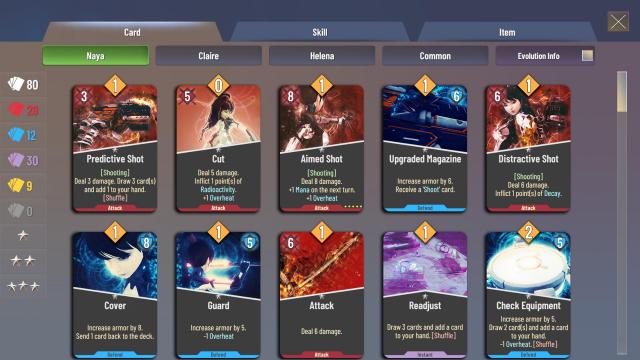
If any of that sounds intriguing, appreciate it because, outside of an additional paragraph or two, that's all there is. It's hardly a bad thing for a game to focus on gameplay, but at the same time it's hardly unreasonable to expect a certain degree of cohesiveness between a game and its framework. I'm not saying Tinogames needs to start hiring George R.R. Martin, but it would be nice having someone who cares enough about their world to look for typos on the title screen. From a technical perspective, Neoverse has easily achieved seventh generation levels of talent, but from a narrative and production value standpoint it's at least two to three generations behind that and it shouldn't be.
The core gameplay of Neoverse is quite deep and anyone jonesing for another roguelite or CCG will get their fix here. Those familiar with the aforementioned M:TG or any of its descendants will have little trouble picking up on the rules, and the uninitiated won't be too far behind; red cards deal damage, while blue ones provide defense. Purples are instant and have spell-like properties, and Yellow constant cards bestow various enchantments upon the character. Black hinderance cards can potentially obscure a deck's original vision, but in certain situations can be invaluable resources.
A variety of status effects also exist, such as vampiric, radioactivity, faith, punishment, and reflect. Defeating an enemy with the exact number of HP required will trigger a precision bonus, while defending against an attack with the correct number will parry the opponent, temporarily incapacitating them. A Chrono Cross-like battle tech details what order to play cards in to gain a combo, doubling the damage of the next attack. Skill trees flesh out a character's passive abilities, linking up to a shop where additional cards, skill points, and consumable items can be purchased.
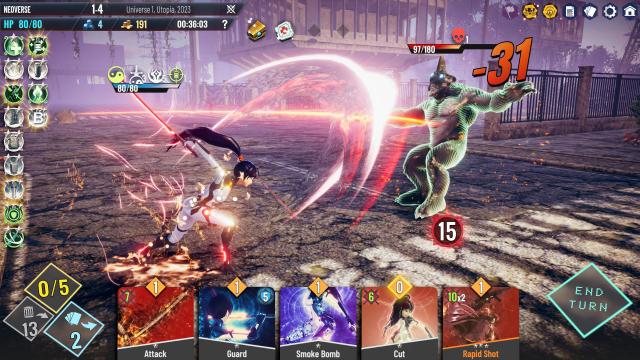
Every turn, players spend their Mana/Action Points trying to connect these interlocking systems as best they can, while playing through one of three different game modes. No two playthroughs will be quite the same, but all will be anchored by their chosen heroine, each with their own unique cards, skills, costumes, and gear. One has a clear advantage over the others, but with the right set-up and a dose of luck anyone can be viable.
The catsuit-clad Agent Naya is the first character available, yet interestingly is the most difficult to utilize. I applaud Tinogames for making this decision, as it forces players to experience the potential consequences of their actions and those of their enemies, training them to adapt to the situation instead of always trying to manipulate it.
Naya's playstyle revolves around plaguing the battlefield with radioactivity and peppering it with various attacks and cheap, replicating shooting cards. Many of her actions generate overheat and if five consecutive overheat is generated, then a hinderance card is added to the deck that damages her. While these can be discarded, they can only be removed if directly used; it doesn't take long for a reckless Naya to fatten her deck with useless cards, costing her valuable time she can't afford to waste. She also lacks the health restoration and defense-generating capabilities of her contemporaries, making her appear to be a less than ideal choice. On top of all that, she's the most gear dependent of the ladies, requiring more thought when plotting her course throughout the game (she shines in Hunter mode). Naya might seem weak compared to the others, but the hard road she leads players down is the most rewarding when traversed.
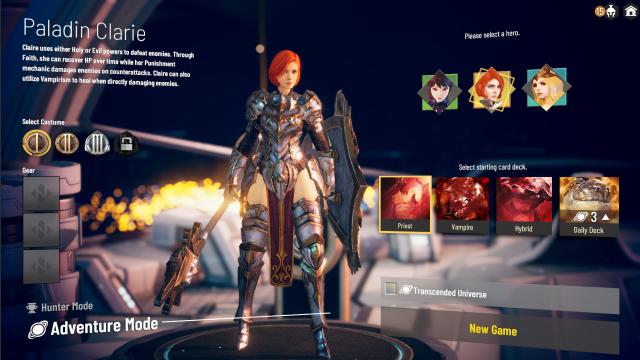
Earning enough profile experience will unlock Paladin Claire. Armed with powerful techniques that synergize with each other on a level beyond anything Naya or Helena can muster, Claire has an inherent versatility that is unmatched. Her vampiric abilities allow her to heal in proportion to the damage she does. Many cards grant faith; when five faith is reached, Claire is dealt one of four unique “God” cards that can instantly turn the tide back in her favor. Others generate punishment that damages attacking enemies equal to how much punishment she has. Add it all together (or multiply it with Repentance, hint hint) and the end result is the best character in the game. Anyone having difficulties with Adventure mode or learning the intricacies of Neoverse is recommended to spend some time with Claire; once you see her true brilliance it becomes very difficult to avert your gaze.
The final character unlocked is Summoner Helena, beloved mother goddess and constant reminder of where the word 'mammal' derives from. Helena represents a middle ground of sorts between Naya and Claire, aided in her journey by three Guardians - pets that augment her offense and defense. The White Lion attacks the weakest enemy in play whenever an attack card is used; the Red Dragon devastates the field with fire breath when an instant is cast; and a Griffon acts as Helena's shield, catapulting her defense to laughably high numbers when defense cards are played. Helena's gameplan isn't as involved as Naya's, or incredibly overpowered like Claire's, but it suffers the least from the random nature of Neoverse and is the most consistent of the cast. The drawbacks are that it's an arduous task to get Helena up to par, and once it's done it still might not be enough.
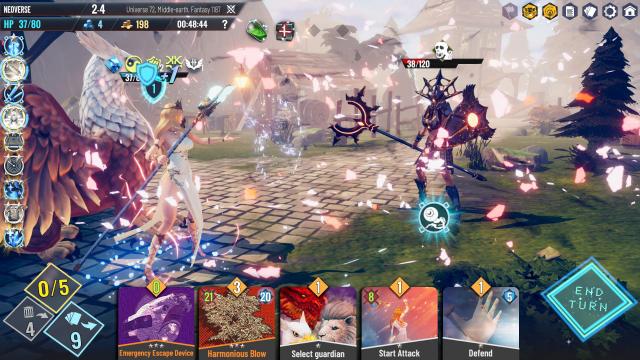
As previously stated, the gameplay of Neoverse is quite strong. So strong in fact that it highlights the game's weaknesses in every other category, exposing them for what they are. The opening crawl of text on the title screen alone is an embarrassment and an example of why AAA developers invest in dedicated localization teams. Navigation is surprisingly clunky, with incorrect button mapping in places and menus occasionally failing to materialize. Some of this might have been forgivable, but considering that Trinity Edition is a re-release of a game available on several platforms, it's clear Tinogames just doesn't care. If it did, we might be able to answer the most basic questions concerning its lore. What sort of agency does Naya work for? How does being a paladin explain Claire's ability to “become evil”? Does Helena ever learn about the concept of 'modesty', or at least encounter a universe that invented undergarments? I have no answers - there are none to be found.
Neoverse can be fun, but difficult to enjoy. The core loop of the overall gameplay is addictive and compelling, but wrapped around it are the classic litany of shortcomings indicative of indie games, many of which should have disappeared a generation or two ago. Confounding this further is the random nature of the rougelite. It can be hard to play a game for an hour knowing you're going to lose, and more often than not that's the case here. Conversely, victory feels as hollow as defeat; players are given a mere paragraph of exposition telling them how many lives were saved (their score), before the credits roll and they're booted to same cold title screen they would have went to if they had lost. Like any decent low-budget movie, Neoverse's virtues are true, but held back by the confines of its creation. Fans of CCGs and indies will probably look past its faults, but Tinogames needs to level up all aspects of its development if it's going to create something truly memorable.
It clearly has the talent. This isn't about skill - it's about will.
VGChartz Verdict
6
Decent
This review is based on a digital copy of Neoverse Trinity Edition for the NS








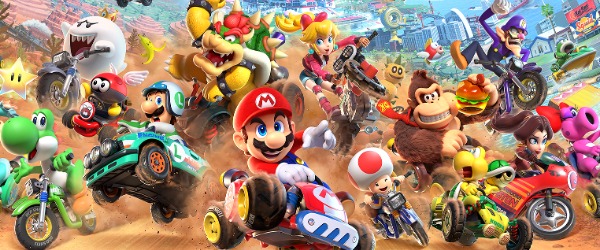
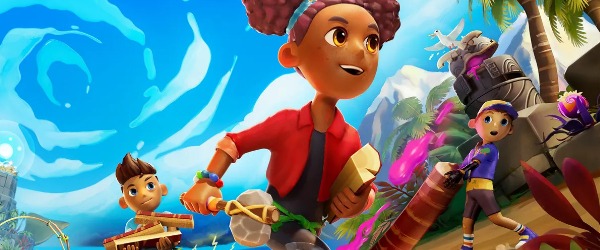
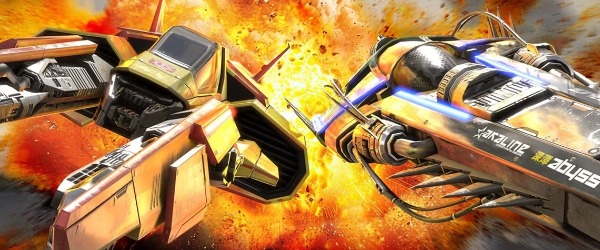
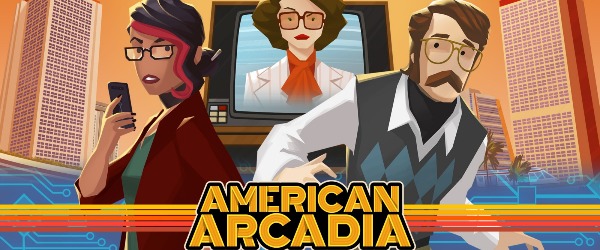












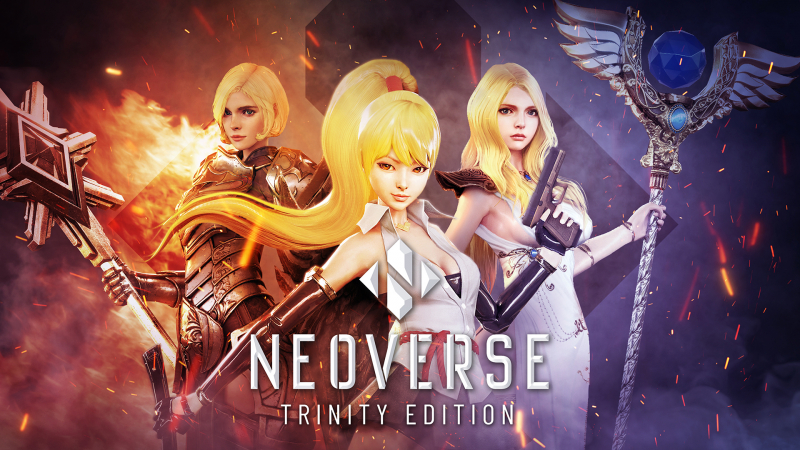

 Essay Pro
Essay Pro